INFO6010: Influential Factors in IT Project Management Report
VerifiedAdded on 2022/11/10
|22
|6230
|195
Report
AI Summary
This report discusses the key factors influencing the planning and execution of IT projects, focusing on communication management, project governance, and change management. It emphasizes the importance of project planning as a guide for project execution, particularly in the context of implementing a disaster recovery capability for critical business applications. The report details the roles, deliverables, and risks associated with each of the three focus areas, highlighting their impact on project success. It also underscores the significance of effective project management in achieving project goals and managing constraints, referencing the INFO6010 course material.

Running head: ADVANCE PROJECT MANAGEMENT IN IT
Advance Project Management in IT
Name of Student
Name of University
Author Note
Advance Project Management in IT
Name of Student
Name of University
Author Note
Paraphrase This Document
Need a fresh take? Get an instant paraphrase of this document with our AI Paraphraser
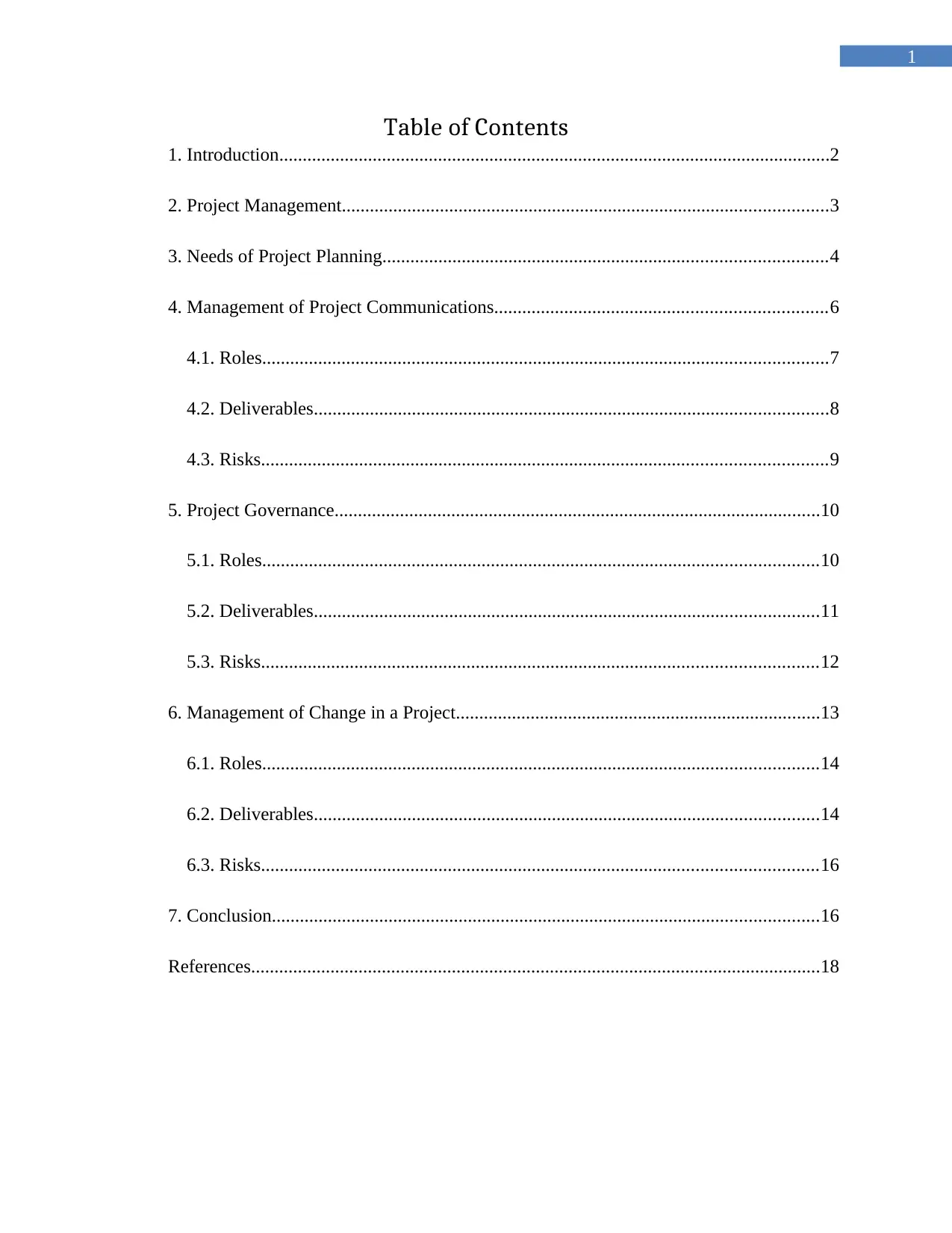
1
Table of Contents
1. Introduction......................................................................................................................2
2. Project Management........................................................................................................3
3. Needs of Project Planning...............................................................................................4
4. Management of Project Communications.......................................................................6
4.1. Roles.........................................................................................................................7
4.2. Deliverables..............................................................................................................8
4.3. Risks.........................................................................................................................9
5. Project Governance........................................................................................................10
5.1. Roles.......................................................................................................................10
5.2. Deliverables............................................................................................................11
5.3. Risks.......................................................................................................................12
6. Management of Change in a Project..............................................................................13
6.1. Roles.......................................................................................................................14
6.2. Deliverables............................................................................................................14
6.3. Risks.......................................................................................................................16
7. Conclusion.....................................................................................................................16
References..........................................................................................................................18
Table of Contents
1. Introduction......................................................................................................................2
2. Project Management........................................................................................................3
3. Needs of Project Planning...............................................................................................4
4. Management of Project Communications.......................................................................6
4.1. Roles.........................................................................................................................7
4.2. Deliverables..............................................................................................................8
4.3. Risks.........................................................................................................................9
5. Project Governance........................................................................................................10
5.1. Roles.......................................................................................................................10
5.2. Deliverables............................................................................................................11
5.3. Risks.......................................................................................................................12
6. Management of Change in a Project..............................................................................13
6.1. Roles.......................................................................................................................14
6.2. Deliverables............................................................................................................14
6.3. Risks.......................................................................................................................16
7. Conclusion.....................................................................................................................16
References..........................................................................................................................18
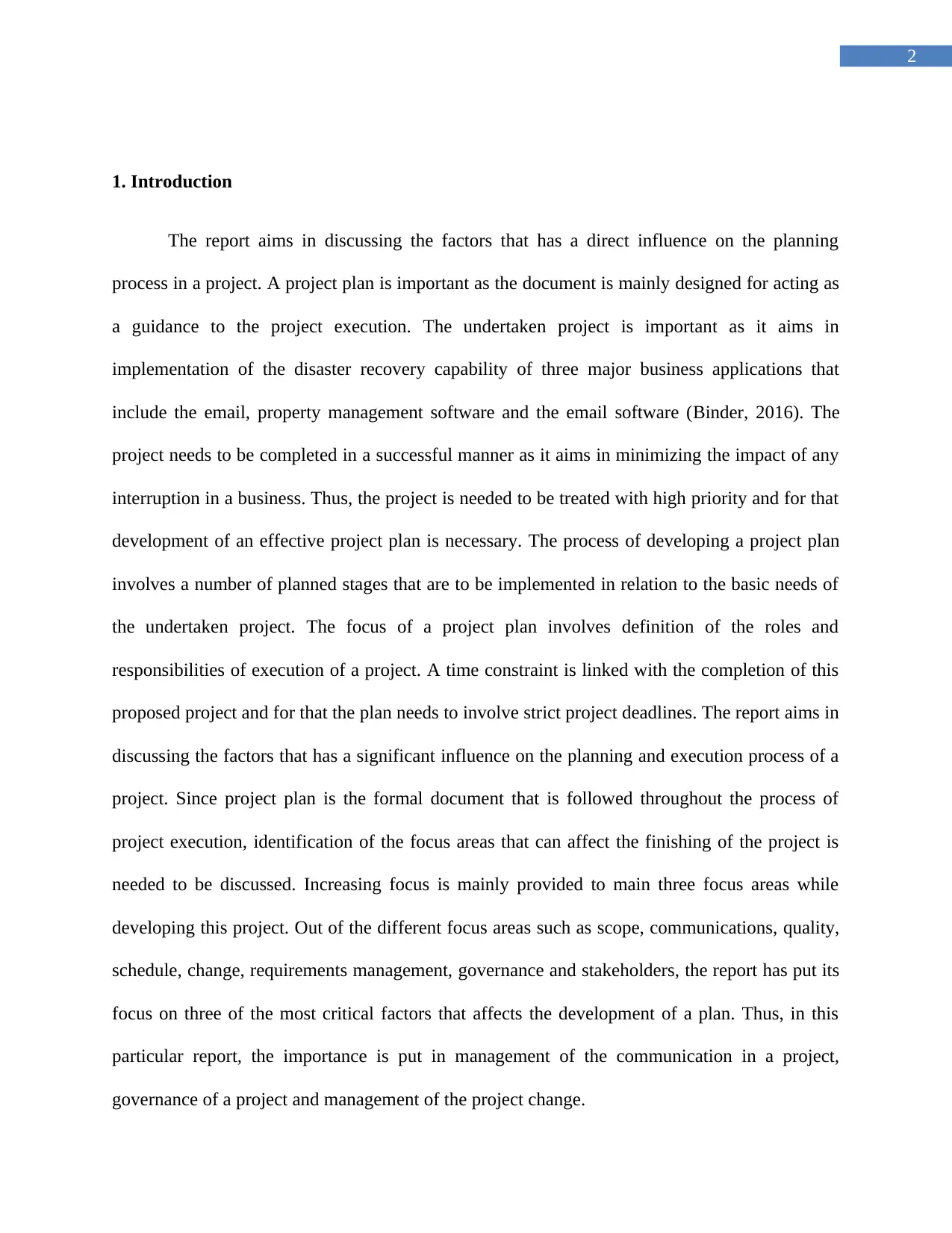
2
1. Introduction
The report aims in discussing the factors that has a direct influence on the planning
process in a project. A project plan is important as the document is mainly designed for acting as
a guidance to the project execution. The undertaken project is important as it aims in
implementation of the disaster recovery capability of three major business applications that
include the email, property management software and the email software (Binder, 2016). The
project needs to be completed in a successful manner as it aims in minimizing the impact of any
interruption in a business. Thus, the project is needed to be treated with high priority and for that
development of an effective project plan is necessary. The process of developing a project plan
involves a number of planned stages that are to be implemented in relation to the basic needs of
the undertaken project. The focus of a project plan involves definition of the roles and
responsibilities of execution of a project. A time constraint is linked with the completion of this
proposed project and for that the plan needs to involve strict project deadlines. The report aims in
discussing the factors that has a significant influence on the planning and execution process of a
project. Since project plan is the formal document that is followed throughout the process of
project execution, identification of the focus areas that can affect the finishing of the project is
needed to be discussed. Increasing focus is mainly provided to main three focus areas while
developing this project. Out of the different focus areas such as scope, communications, quality,
schedule, change, requirements management, governance and stakeholders, the report has put its
focus on three of the most critical factors that affects the development of a plan. Thus, in this
particular report, the importance is put in management of the communication in a project,
governance of a project and management of the project change.
1. Introduction
The report aims in discussing the factors that has a direct influence on the planning
process in a project. A project plan is important as the document is mainly designed for acting as
a guidance to the project execution. The undertaken project is important as it aims in
implementation of the disaster recovery capability of three major business applications that
include the email, property management software and the email software (Binder, 2016). The
project needs to be completed in a successful manner as it aims in minimizing the impact of any
interruption in a business. Thus, the project is needed to be treated with high priority and for that
development of an effective project plan is necessary. The process of developing a project plan
involves a number of planned stages that are to be implemented in relation to the basic needs of
the undertaken project. The focus of a project plan involves definition of the roles and
responsibilities of execution of a project. A time constraint is linked with the completion of this
proposed project and for that the plan needs to involve strict project deadlines. The report aims in
discussing the factors that has a significant influence on the planning and execution process of a
project. Since project plan is the formal document that is followed throughout the process of
project execution, identification of the focus areas that can affect the finishing of the project is
needed to be discussed. Increasing focus is mainly provided to main three focus areas while
developing this project. Out of the different focus areas such as scope, communications, quality,
schedule, change, requirements management, governance and stakeholders, the report has put its
focus on three of the most critical factors that affects the development of a plan. Thus, in this
particular report, the importance is put in management of the communication in a project,
governance of a project and management of the project change.
⊘ This is a preview!⊘
Do you want full access?
Subscribe today to unlock all pages.

Trusted by 1+ million students worldwide
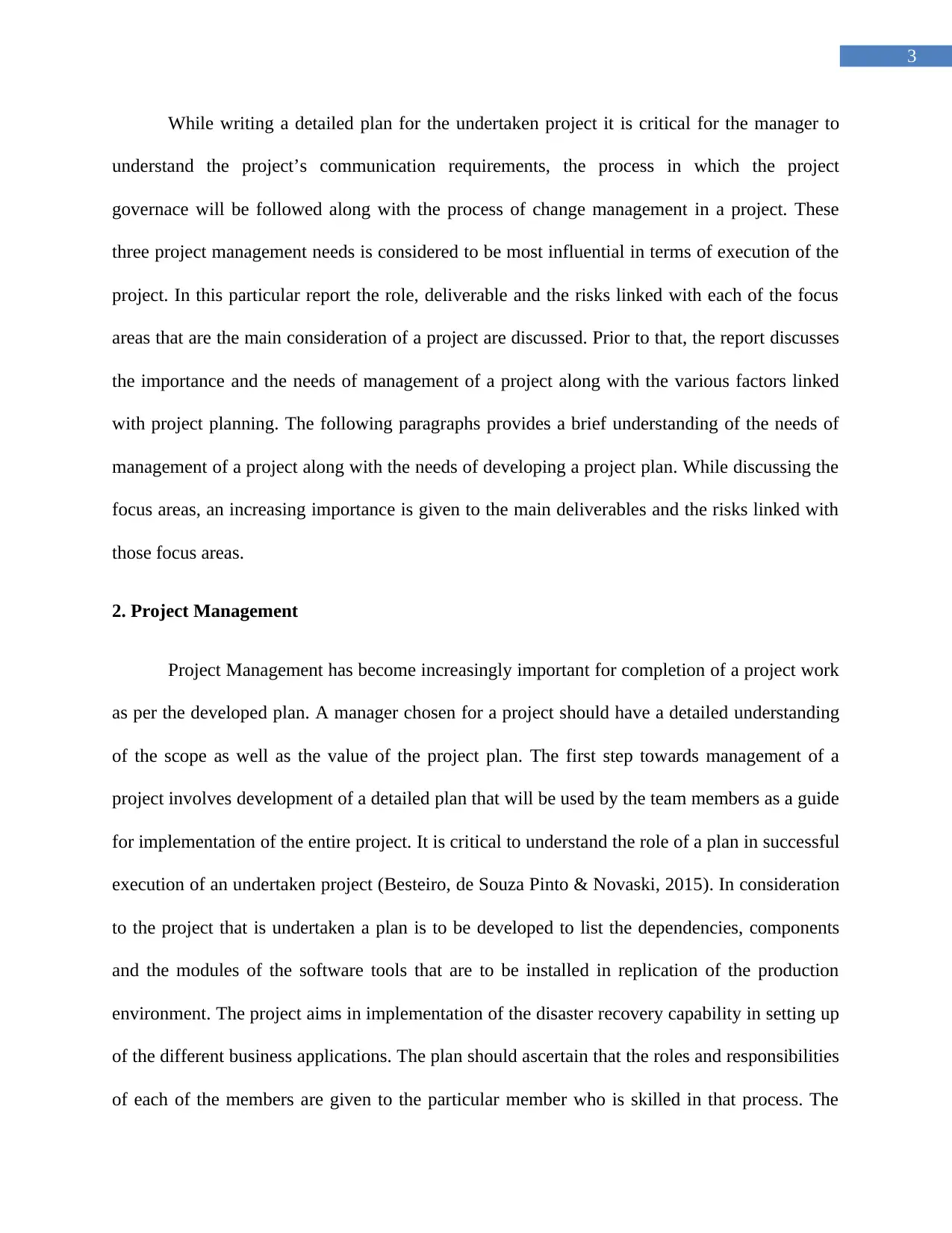
3
While writing a detailed plan for the undertaken project it is critical for the manager to
understand the project’s communication requirements, the process in which the project
governace will be followed along with the process of change management in a project. These
three project management needs is considered to be most influential in terms of execution of the
project. In this particular report the role, deliverable and the risks linked with each of the focus
areas that are the main consideration of a project are discussed. Prior to that, the report discusses
the importance and the needs of management of a project along with the various factors linked
with project planning. The following paragraphs provides a brief understanding of the needs of
management of a project along with the needs of developing a project plan. While discussing the
focus areas, an increasing importance is given to the main deliverables and the risks linked with
those focus areas.
2. Project Management
Project Management has become increasingly important for completion of a project work
as per the developed plan. A manager chosen for a project should have a detailed understanding
of the scope as well as the value of the project plan. The first step towards management of a
project involves development of a detailed plan that will be used by the team members as a guide
for implementation of the entire project. It is critical to understand the role of a plan in successful
execution of an undertaken project (Besteiro, de Souza Pinto & Novaski, 2015). In consideration
to the project that is undertaken a plan is to be developed to list the dependencies, components
and the modules of the software tools that are to be installed in replication of the production
environment. The project aims in implementation of the disaster recovery capability in setting up
of the different business applications. The plan should ascertain that the roles and responsibilities
of each of the members are given to the particular member who is skilled in that process. The
While writing a detailed plan for the undertaken project it is critical for the manager to
understand the project’s communication requirements, the process in which the project
governace will be followed along with the process of change management in a project. These
three project management needs is considered to be most influential in terms of execution of the
project. In this particular report the role, deliverable and the risks linked with each of the focus
areas that are the main consideration of a project are discussed. Prior to that, the report discusses
the importance and the needs of management of a project along with the various factors linked
with project planning. The following paragraphs provides a brief understanding of the needs of
management of a project along with the needs of developing a project plan. While discussing the
focus areas, an increasing importance is given to the main deliverables and the risks linked with
those focus areas.
2. Project Management
Project Management has become increasingly important for completion of a project work
as per the developed plan. A manager chosen for a project should have a detailed understanding
of the scope as well as the value of the project plan. The first step towards management of a
project involves development of a detailed plan that will be used by the team members as a guide
for implementation of the entire project. It is critical to understand the role of a plan in successful
execution of an undertaken project (Besteiro, de Souza Pinto & Novaski, 2015). In consideration
to the project that is undertaken a plan is to be developed to list the dependencies, components
and the modules of the software tools that are to be installed in replication of the production
environment. The project aims in implementation of the disaster recovery capability in setting up
of the different business applications. The plan should ascertain that the roles and responsibilities
of each of the members are given to the particular member who is skilled in that process. The
Paraphrase This Document
Need a fresh take? Get an instant paraphrase of this document with our AI Paraphraser
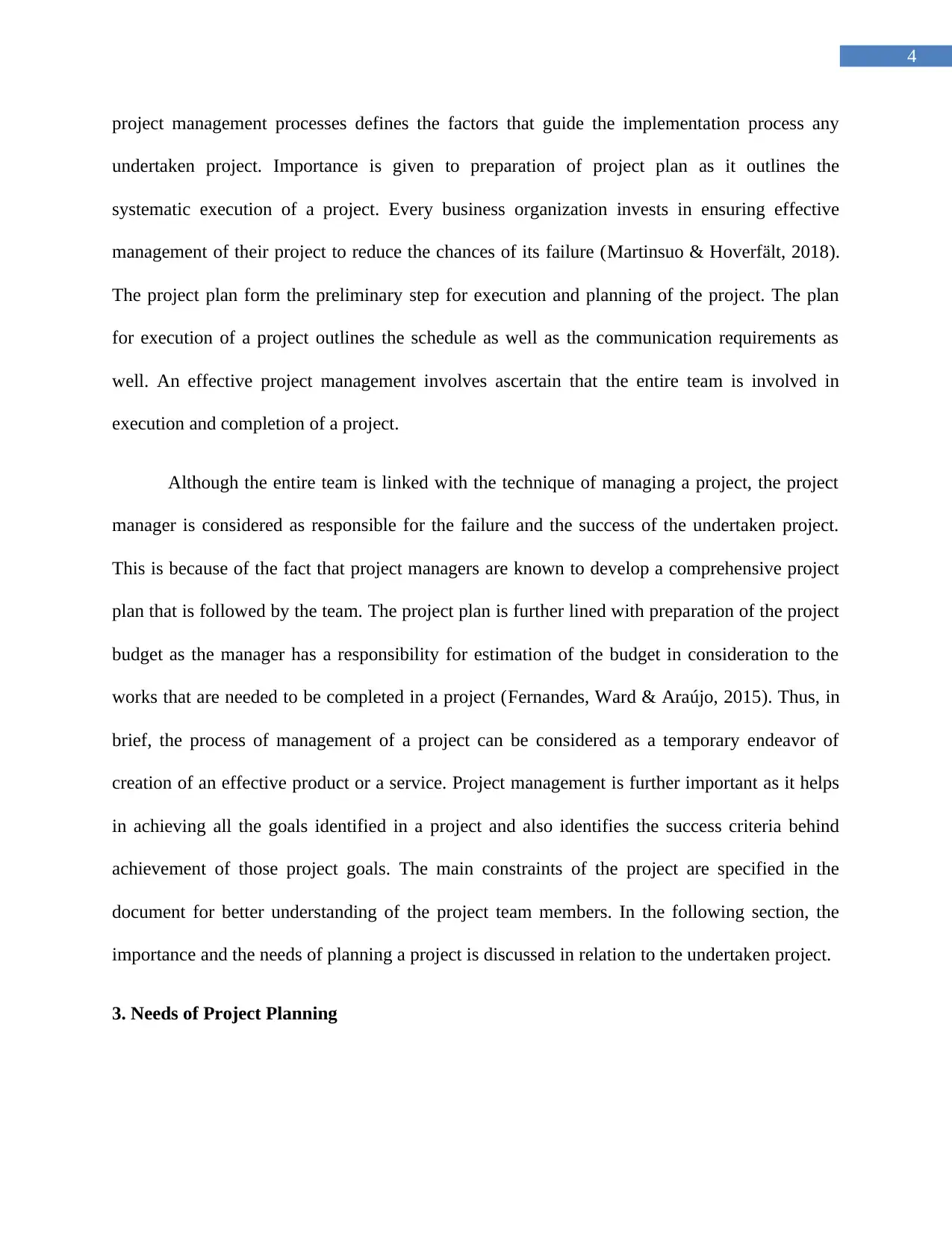
4
project management processes defines the factors that guide the implementation process any
undertaken project. Importance is given to preparation of project plan as it outlines the
systematic execution of a project. Every business organization invests in ensuring effective
management of their project to reduce the chances of its failure (Martinsuo & Hoverfält, 2018).
The project plan form the preliminary step for execution and planning of the project. The plan
for execution of a project outlines the schedule as well as the communication requirements as
well. An effective project management involves ascertain that the entire team is involved in
execution and completion of a project.
Although the entire team is linked with the technique of managing a project, the project
manager is considered as responsible for the failure and the success of the undertaken project.
This is because of the fact that project managers are known to develop a comprehensive project
plan that is followed by the team. The project plan is further lined with preparation of the project
budget as the manager has a responsibility for estimation of the budget in consideration to the
works that are needed to be completed in a project (Fernandes, Ward & Araújo, 2015). Thus, in
brief, the process of management of a project can be considered as a temporary endeavor of
creation of an effective product or a service. Project management is further important as it helps
in achieving all the goals identified in a project and also identifies the success criteria behind
achievement of those project goals. The main constraints of the project are specified in the
document for better understanding of the project team members. In the following section, the
importance and the needs of planning a project is discussed in relation to the undertaken project.
3. Needs of Project Planning
project management processes defines the factors that guide the implementation process any
undertaken project. Importance is given to preparation of project plan as it outlines the
systematic execution of a project. Every business organization invests in ensuring effective
management of their project to reduce the chances of its failure (Martinsuo & Hoverfält, 2018).
The project plan form the preliminary step for execution and planning of the project. The plan
for execution of a project outlines the schedule as well as the communication requirements as
well. An effective project management involves ascertain that the entire team is involved in
execution and completion of a project.
Although the entire team is linked with the technique of managing a project, the project
manager is considered as responsible for the failure and the success of the undertaken project.
This is because of the fact that project managers are known to develop a comprehensive project
plan that is followed by the team. The project plan is further lined with preparation of the project
budget as the manager has a responsibility for estimation of the budget in consideration to the
works that are needed to be completed in a project (Fernandes, Ward & Araújo, 2015). Thus, in
brief, the process of management of a project can be considered as a temporary endeavor of
creation of an effective product or a service. Project management is further important as it helps
in achieving all the goals identified in a project and also identifies the success criteria behind
achievement of those project goals. The main constraints of the project are specified in the
document for better understanding of the project team members. In the following section, the
importance and the needs of planning a project is discussed in relation to the undertaken project.
3. Needs of Project Planning
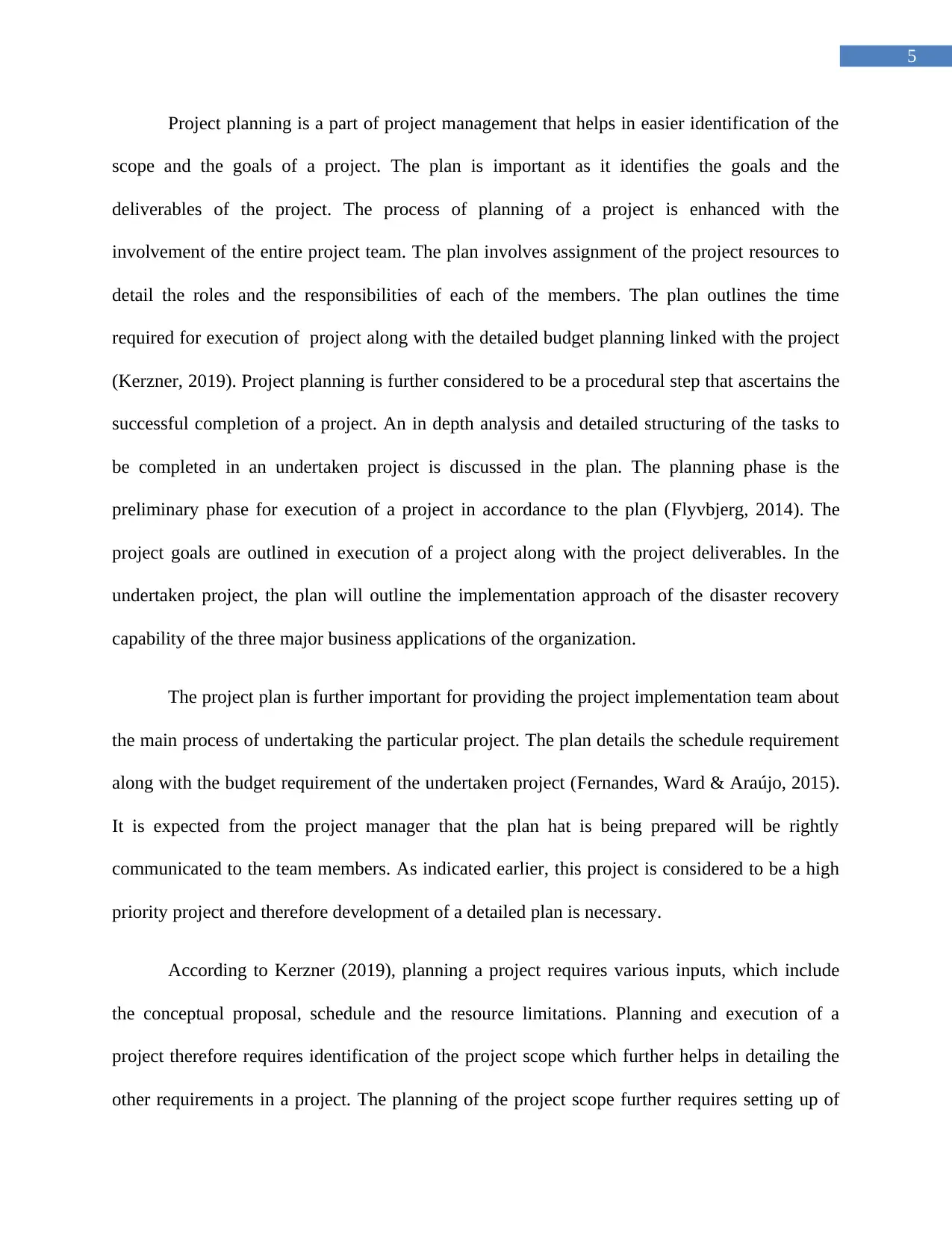
5
Project planning is a part of project management that helps in easier identification of the
scope and the goals of a project. The plan is important as it identifies the goals and the
deliverables of the project. The process of planning of a project is enhanced with the
involvement of the entire project team. The plan involves assignment of the project resources to
detail the roles and the responsibilities of each of the members. The plan outlines the time
required for execution of project along with the detailed budget planning linked with the project
(Kerzner, 2019). Project planning is further considered to be a procedural step that ascertains the
successful completion of a project. An in depth analysis and detailed structuring of the tasks to
be completed in an undertaken project is discussed in the plan. The planning phase is the
preliminary phase for execution of a project in accordance to the plan (Flyvbjerg, 2014). The
project goals are outlined in execution of a project along with the project deliverables. In the
undertaken project, the plan will outline the implementation approach of the disaster recovery
capability of the three major business applications of the organization.
The project plan is further important for providing the project implementation team about
the main process of undertaking the particular project. The plan details the schedule requirement
along with the budget requirement of the undertaken project (Fernandes, Ward & Araújo, 2015).
It is expected from the project manager that the plan hat is being prepared will be rightly
communicated to the team members. As indicated earlier, this project is considered to be a high
priority project and therefore development of a detailed plan is necessary.
According to Kerzner (2019), planning a project requires various inputs, which include
the conceptual proposal, schedule and the resource limitations. Planning and execution of a
project therefore requires identification of the project scope which further helps in detailing the
other requirements in a project. The planning of the project scope further requires setting up of
Project planning is a part of project management that helps in easier identification of the
scope and the goals of a project. The plan is important as it identifies the goals and the
deliverables of the project. The process of planning of a project is enhanced with the
involvement of the entire project team. The plan involves assignment of the project resources to
detail the roles and the responsibilities of each of the members. The plan outlines the time
required for execution of project along with the detailed budget planning linked with the project
(Kerzner, 2019). Project planning is further considered to be a procedural step that ascertains the
successful completion of a project. An in depth analysis and detailed structuring of the tasks to
be completed in an undertaken project is discussed in the plan. The planning phase is the
preliminary phase for execution of a project in accordance to the plan (Flyvbjerg, 2014). The
project goals are outlined in execution of a project along with the project deliverables. In the
undertaken project, the plan will outline the implementation approach of the disaster recovery
capability of the three major business applications of the organization.
The project plan is further important for providing the project implementation team about
the main process of undertaking the particular project. The plan details the schedule requirement
along with the budget requirement of the undertaken project (Fernandes, Ward & Araújo, 2015).
It is expected from the project manager that the plan hat is being prepared will be rightly
communicated to the team members. As indicated earlier, this project is considered to be a high
priority project and therefore development of a detailed plan is necessary.
According to Kerzner (2019), planning a project requires various inputs, which include
the conceptual proposal, schedule and the resource limitations. Planning and execution of a
project therefore requires identification of the project scope which further helps in detailing the
other requirements in a project. The planning of the project scope further requires setting up of
⊘ This is a preview!⊘
Do you want full access?
Subscribe today to unlock all pages.

Trusted by 1+ million students worldwide
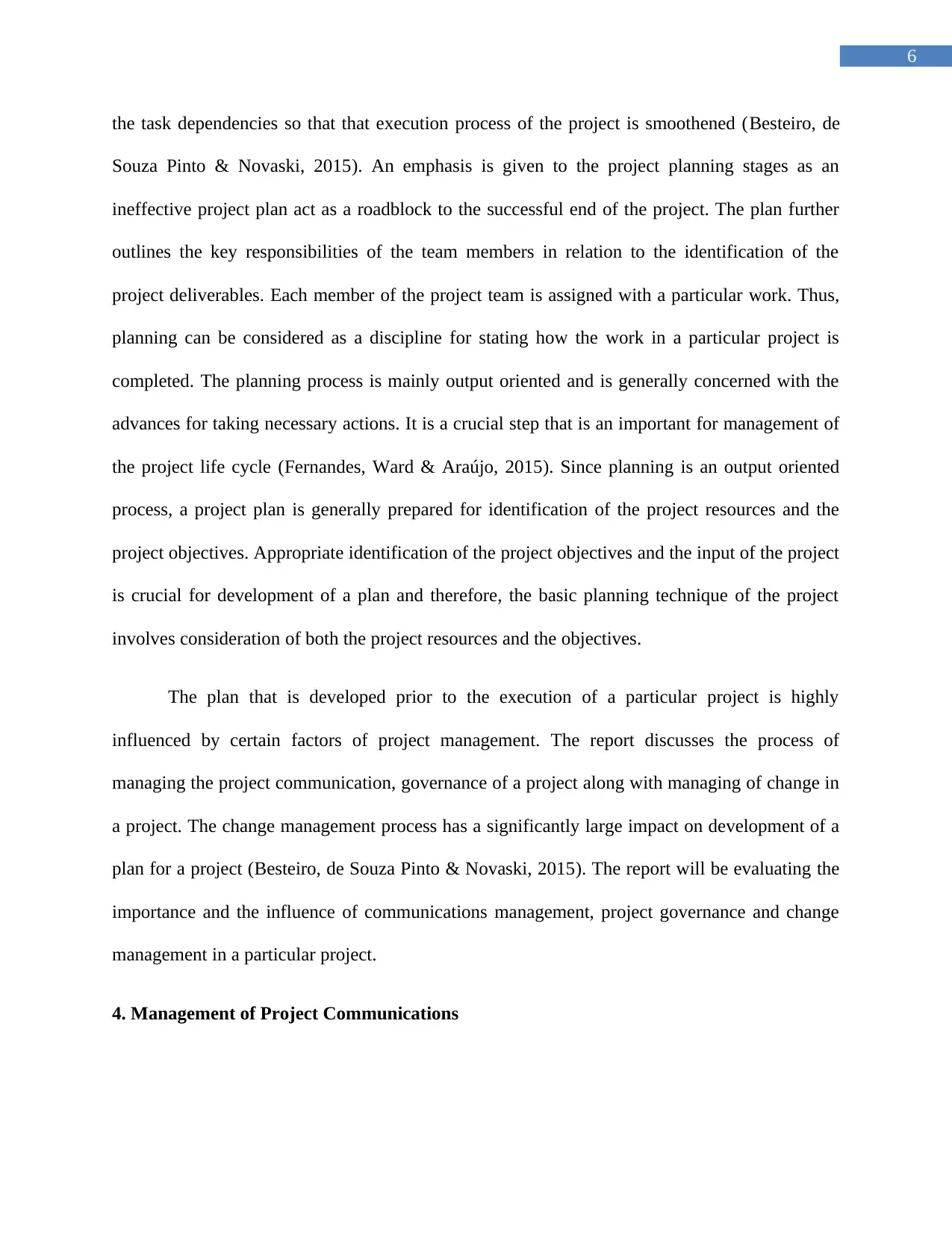
6
the task dependencies so that that execution process of the project is smoothened (Besteiro, de
Souza Pinto & Novaski, 2015). An emphasis is given to the project planning stages as an
ineffective project plan act as a roadblock to the successful end of the project. The plan further
outlines the key responsibilities of the team members in relation to the identification of the
project deliverables. Each member of the project team is assigned with a particular work. Thus,
planning can be considered as a discipline for stating how the work in a particular project is
completed. The planning process is mainly output oriented and is generally concerned with the
advances for taking necessary actions. It is a crucial step that is an important for management of
the project life cycle (Fernandes, Ward & Araújo, 2015). Since planning is an output oriented
process, a project plan is generally prepared for identification of the project resources and the
project objectives. Appropriate identification of the project objectives and the input of the project
is crucial for development of a plan and therefore, the basic planning technique of the project
involves consideration of both the project resources and the objectives.
The plan that is developed prior to the execution of a particular project is highly
influenced by certain factors of project management. The report discusses the process of
managing the project communication, governance of a project along with managing of change in
a project. The change management process has a significantly large impact on development of a
plan for a project (Besteiro, de Souza Pinto & Novaski, 2015). The report will be evaluating the
importance and the influence of communications management, project governance and change
management in a particular project.
4. Management of Project Communications
the task dependencies so that that execution process of the project is smoothened (Besteiro, de
Souza Pinto & Novaski, 2015). An emphasis is given to the project planning stages as an
ineffective project plan act as a roadblock to the successful end of the project. The plan further
outlines the key responsibilities of the team members in relation to the identification of the
project deliverables. Each member of the project team is assigned with a particular work. Thus,
planning can be considered as a discipline for stating how the work in a particular project is
completed. The planning process is mainly output oriented and is generally concerned with the
advances for taking necessary actions. It is a crucial step that is an important for management of
the project life cycle (Fernandes, Ward & Araújo, 2015). Since planning is an output oriented
process, a project plan is generally prepared for identification of the project resources and the
project objectives. Appropriate identification of the project objectives and the input of the project
is crucial for development of a plan and therefore, the basic planning technique of the project
involves consideration of both the project resources and the objectives.
The plan that is developed prior to the execution of a particular project is highly
influenced by certain factors of project management. The report discusses the process of
managing the project communication, governance of a project along with managing of change in
a project. The change management process has a significantly large impact on development of a
plan for a project (Besteiro, de Souza Pinto & Novaski, 2015). The report will be evaluating the
importance and the influence of communications management, project governance and change
management in a particular project.
4. Management of Project Communications
Paraphrase This Document
Need a fresh take? Get an instant paraphrase of this document with our AI Paraphraser
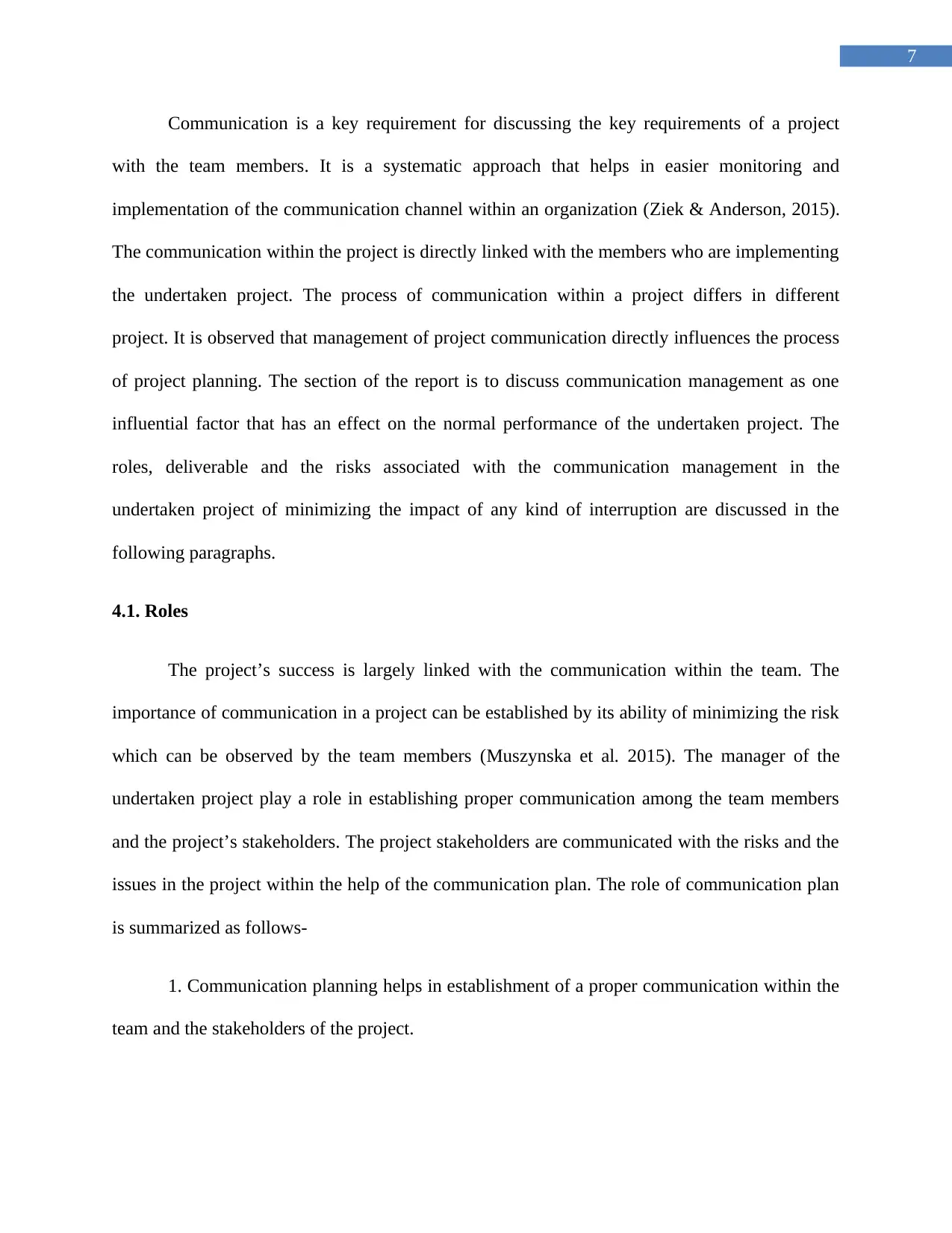
7
Communication is a key requirement for discussing the key requirements of a project
with the team members. It is a systematic approach that helps in easier monitoring and
implementation of the communication channel within an organization (Ziek & Anderson, 2015).
The communication within the project is directly linked with the members who are implementing
the undertaken project. The process of communication within a project differs in different
project. It is observed that management of project communication directly influences the process
of project planning. The section of the report is to discuss communication management as one
influential factor that has an effect on the normal performance of the undertaken project. The
roles, deliverable and the risks associated with the communication management in the
undertaken project of minimizing the impact of any kind of interruption are discussed in the
following paragraphs.
4.1. Roles
The project’s success is largely linked with the communication within the team. The
importance of communication in a project can be established by its ability of minimizing the risk
which can be observed by the team members (Muszynska et al. 2015). The manager of the
undertaken project play a role in establishing proper communication among the team members
and the project’s stakeholders. The project stakeholders are communicated with the risks and the
issues in the project within the help of the communication plan. The role of communication plan
is summarized as follows-
1. Communication planning helps in establishment of a proper communication within the
team and the stakeholders of the project.
Communication is a key requirement for discussing the key requirements of a project
with the team members. It is a systematic approach that helps in easier monitoring and
implementation of the communication channel within an organization (Ziek & Anderson, 2015).
The communication within the project is directly linked with the members who are implementing
the undertaken project. The process of communication within a project differs in different
project. It is observed that management of project communication directly influences the process
of project planning. The section of the report is to discuss communication management as one
influential factor that has an effect on the normal performance of the undertaken project. The
roles, deliverable and the risks associated with the communication management in the
undertaken project of minimizing the impact of any kind of interruption are discussed in the
following paragraphs.
4.1. Roles
The project’s success is largely linked with the communication within the team. The
importance of communication in a project can be established by its ability of minimizing the risk
which can be observed by the team members (Muszynska et al. 2015). The manager of the
undertaken project play a role in establishing proper communication among the team members
and the project’s stakeholders. The project stakeholders are communicated with the risks and the
issues in the project within the help of the communication plan. The role of communication plan
is summarized as follows-
1. Communication planning helps in establishment of a proper communication within the
team and the stakeholders of the project.
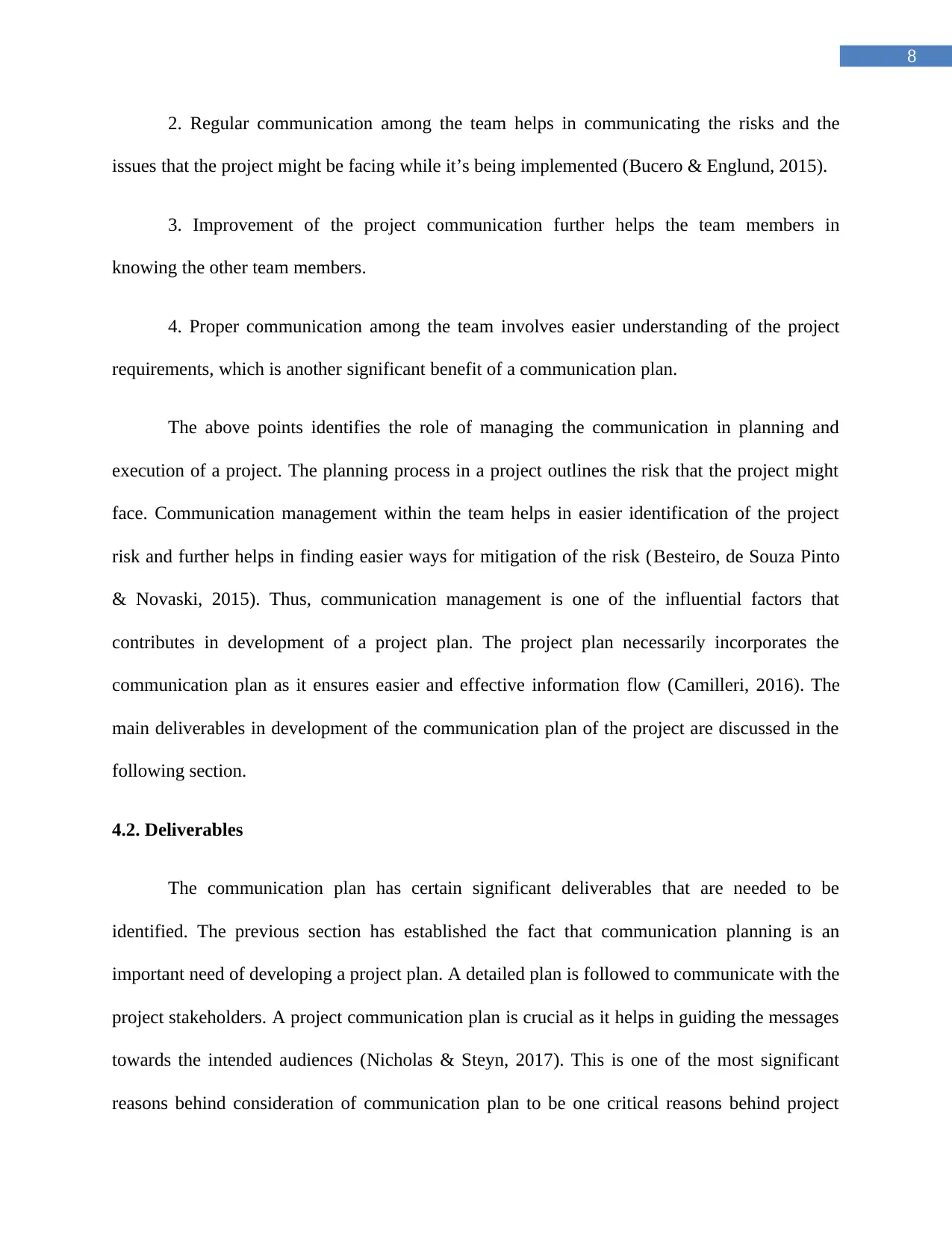
8
2. Regular communication among the team helps in communicating the risks and the
issues that the project might be facing while it’s being implemented (Bucero & Englund, 2015).
3. Improvement of the project communication further helps the team members in
knowing the other team members.
4. Proper communication among the team involves easier understanding of the project
requirements, which is another significant benefit of a communication plan.
The above points identifies the role of managing the communication in planning and
execution of a project. The planning process in a project outlines the risk that the project might
face. Communication management within the team helps in easier identification of the project
risk and further helps in finding easier ways for mitigation of the risk (Besteiro, de Souza Pinto
& Novaski, 2015). Thus, communication management is one of the influential factors that
contributes in development of a project plan. The project plan necessarily incorporates the
communication plan as it ensures easier and effective information flow (Camilleri, 2016). The
main deliverables in development of the communication plan of the project are discussed in the
following section.
4.2. Deliverables
The communication plan has certain significant deliverables that are needed to be
identified. The previous section has established the fact that communication planning is an
important need of developing a project plan. A detailed plan is followed to communicate with the
project stakeholders. A project communication plan is crucial as it helps in guiding the messages
towards the intended audiences (Nicholas & Steyn, 2017). This is one of the most significant
reasons behind consideration of communication plan to be one critical reasons behind project
2. Regular communication among the team helps in communicating the risks and the
issues that the project might be facing while it’s being implemented (Bucero & Englund, 2015).
3. Improvement of the project communication further helps the team members in
knowing the other team members.
4. Proper communication among the team involves easier understanding of the project
requirements, which is another significant benefit of a communication plan.
The above points identifies the role of managing the communication in planning and
execution of a project. The planning process in a project outlines the risk that the project might
face. Communication management within the team helps in easier identification of the project
risk and further helps in finding easier ways for mitigation of the risk (Besteiro, de Souza Pinto
& Novaski, 2015). Thus, communication management is one of the influential factors that
contributes in development of a project plan. The project plan necessarily incorporates the
communication plan as it ensures easier and effective information flow (Camilleri, 2016). The
main deliverables in development of the communication plan of the project are discussed in the
following section.
4.2. Deliverables
The communication plan has certain significant deliverables that are needed to be
identified. The previous section has established the fact that communication planning is an
important need of developing a project plan. A detailed plan is followed to communicate with the
project stakeholders. A project communication plan is crucial as it helps in guiding the messages
towards the intended audiences (Nicholas & Steyn, 2017). This is one of the most significant
reasons behind consideration of communication plan to be one critical reasons behind project
⊘ This is a preview!⊘
Do you want full access?
Subscribe today to unlock all pages.

Trusted by 1+ million students worldwide
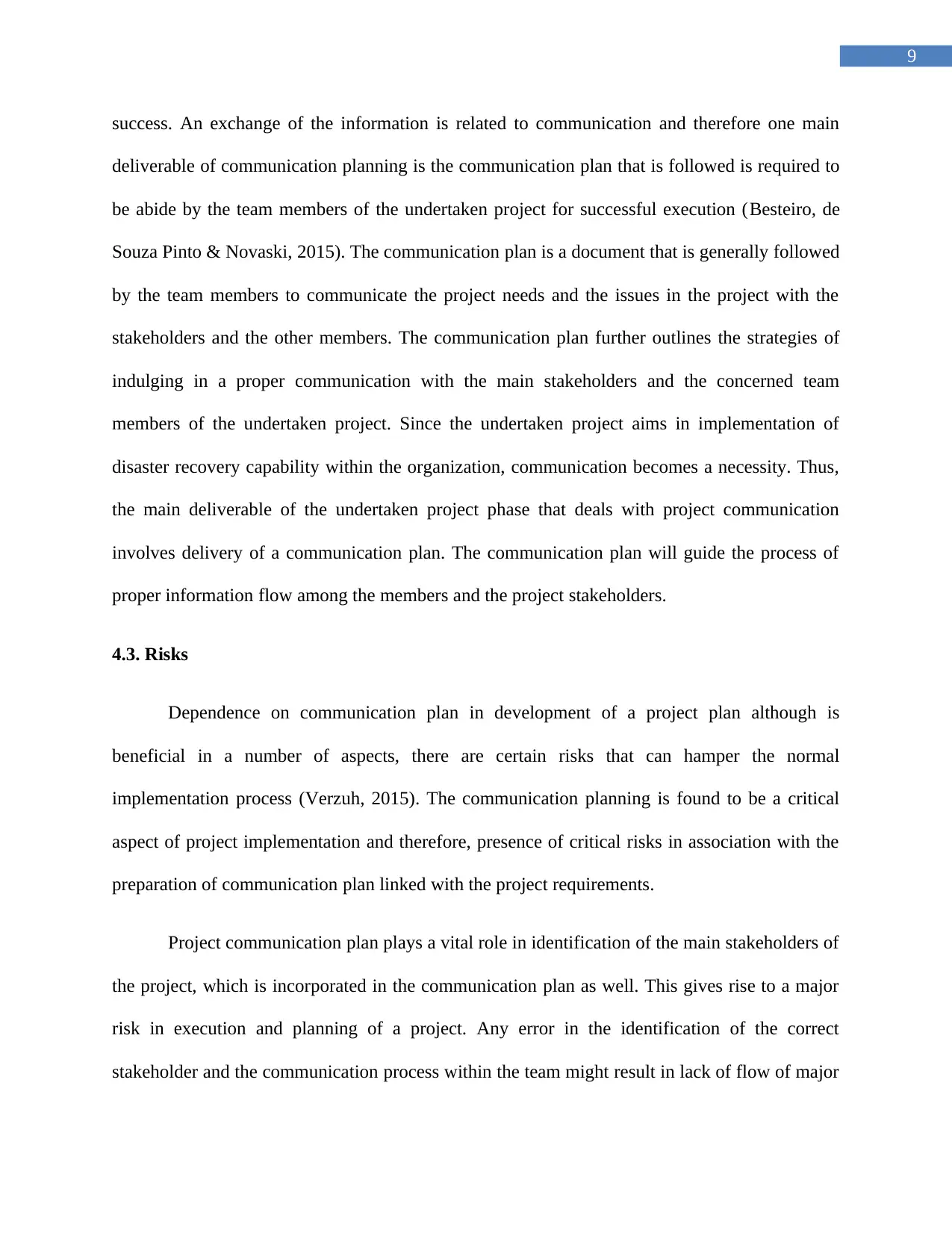
9
success. An exchange of the information is related to communication and therefore one main
deliverable of communication planning is the communication plan that is followed is required to
be abide by the team members of the undertaken project for successful execution (Besteiro, de
Souza Pinto & Novaski, 2015). The communication plan is a document that is generally followed
by the team members to communicate the project needs and the issues in the project with the
stakeholders and the other members. The communication plan further outlines the strategies of
indulging in a proper communication with the main stakeholders and the concerned team
members of the undertaken project. Since the undertaken project aims in implementation of
disaster recovery capability within the organization, communication becomes a necessity. Thus,
the main deliverable of the undertaken project phase that deals with project communication
involves delivery of a communication plan. The communication plan will guide the process of
proper information flow among the members and the project stakeholders.
4.3. Risks
Dependence on communication plan in development of a project plan although is
beneficial in a number of aspects, there are certain risks that can hamper the normal
implementation process (Verzuh, 2015). The communication planning is found to be a critical
aspect of project implementation and therefore, presence of critical risks in association with the
preparation of communication plan linked with the project requirements.
Project communication plan plays a vital role in identification of the main stakeholders of
the project, which is incorporated in the communication plan as well. This gives rise to a major
risk in execution and planning of a project. Any error in the identification of the correct
stakeholder and the communication process within the team might result in lack of flow of major
success. An exchange of the information is related to communication and therefore one main
deliverable of communication planning is the communication plan that is followed is required to
be abide by the team members of the undertaken project for successful execution (Besteiro, de
Souza Pinto & Novaski, 2015). The communication plan is a document that is generally followed
by the team members to communicate the project needs and the issues in the project with the
stakeholders and the other members. The communication plan further outlines the strategies of
indulging in a proper communication with the main stakeholders and the concerned team
members of the undertaken project. Since the undertaken project aims in implementation of
disaster recovery capability within the organization, communication becomes a necessity. Thus,
the main deliverable of the undertaken project phase that deals with project communication
involves delivery of a communication plan. The communication plan will guide the process of
proper information flow among the members and the project stakeholders.
4.3. Risks
Dependence on communication plan in development of a project plan although is
beneficial in a number of aspects, there are certain risks that can hamper the normal
implementation process (Verzuh, 2015). The communication planning is found to be a critical
aspect of project implementation and therefore, presence of critical risks in association with the
preparation of communication plan linked with the project requirements.
Project communication plan plays a vital role in identification of the main stakeholders of
the project, which is incorporated in the communication plan as well. This gives rise to a major
risk in execution and planning of a project. Any error in the identification of the correct
stakeholder and the communication process within the team might result in lack of flow of major
Paraphrase This Document
Need a fresh take? Get an instant paraphrase of this document with our AI Paraphraser
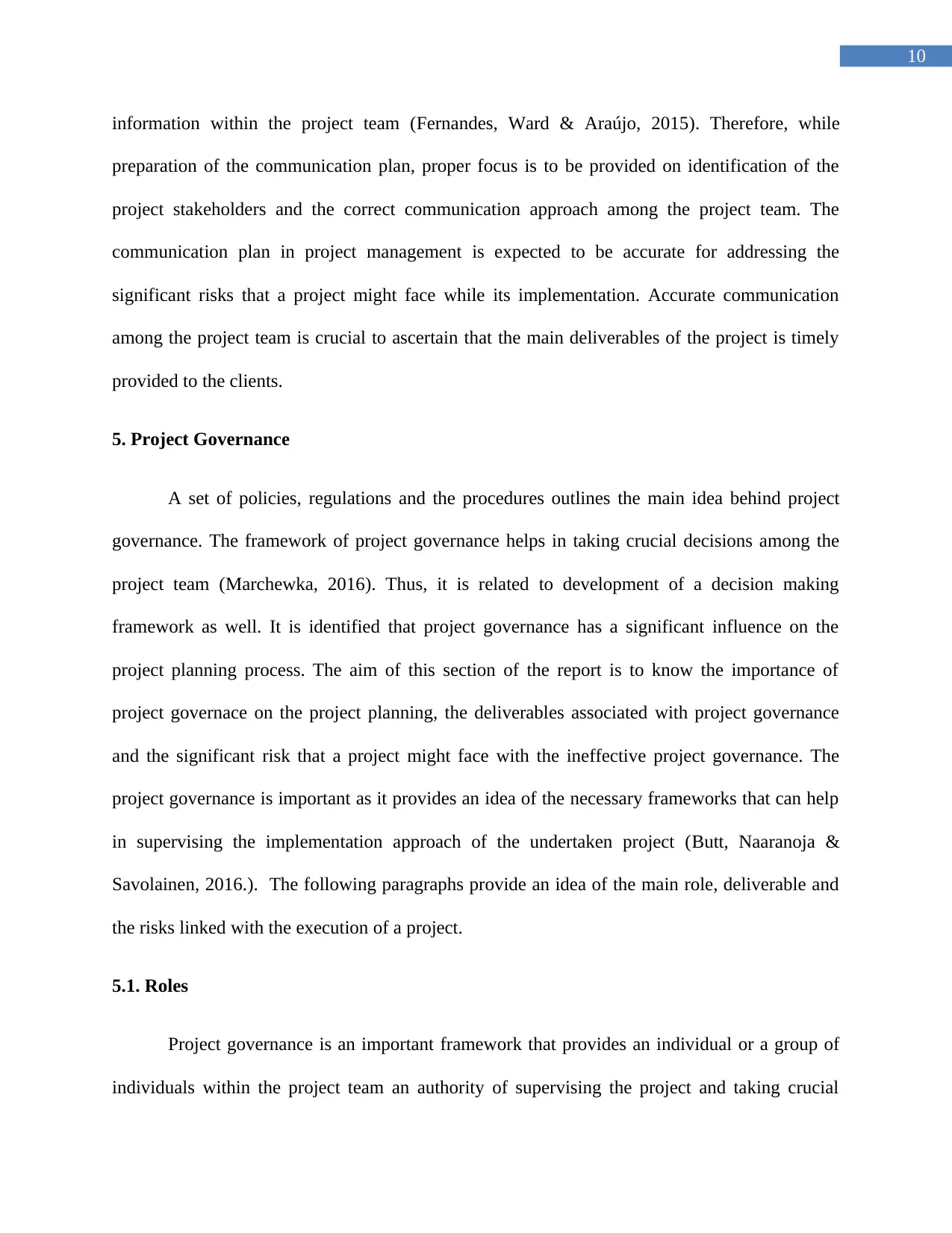
10
information within the project team (Fernandes, Ward & Araújo, 2015). Therefore, while
preparation of the communication plan, proper focus is to be provided on identification of the
project stakeholders and the correct communication approach among the project team. The
communication plan in project management is expected to be accurate for addressing the
significant risks that a project might face while its implementation. Accurate communication
among the project team is crucial to ascertain that the main deliverables of the project is timely
provided to the clients.
5. Project Governance
A set of policies, regulations and the procedures outlines the main idea behind project
governance. The framework of project governance helps in taking crucial decisions among the
project team (Marchewka, 2016). Thus, it is related to development of a decision making
framework as well. It is identified that project governance has a significant influence on the
project planning process. The aim of this section of the report is to know the importance of
project governace on the project planning, the deliverables associated with project governance
and the significant risk that a project might face with the ineffective project governance. The
project governance is important as it provides an idea of the necessary frameworks that can help
in supervising the implementation approach of the undertaken project (Butt, Naaranoja &
Savolainen, 2016.). The following paragraphs provide an idea of the main role, deliverable and
the risks linked with the execution of a project.
5.1. Roles
Project governance is an important framework that provides an individual or a group of
individuals within the project team an authority of supervising the project and taking crucial
information within the project team (Fernandes, Ward & Araújo, 2015). Therefore, while
preparation of the communication plan, proper focus is to be provided on identification of the
project stakeholders and the correct communication approach among the project team. The
communication plan in project management is expected to be accurate for addressing the
significant risks that a project might face while its implementation. Accurate communication
among the project team is crucial to ascertain that the main deliverables of the project is timely
provided to the clients.
5. Project Governance
A set of policies, regulations and the procedures outlines the main idea behind project
governance. The framework of project governance helps in taking crucial decisions among the
project team (Marchewka, 2016). Thus, it is related to development of a decision making
framework as well. It is identified that project governance has a significant influence on the
project planning process. The aim of this section of the report is to know the importance of
project governace on the project planning, the deliverables associated with project governance
and the significant risk that a project might face with the ineffective project governance. The
project governance is important as it provides an idea of the necessary frameworks that can help
in supervising the implementation approach of the undertaken project (Butt, Naaranoja &
Savolainen, 2016.). The following paragraphs provide an idea of the main role, deliverable and
the risks linked with the execution of a project.
5.1. Roles
Project governance is an important framework that provides an individual or a group of
individuals within the project team an authority of supervising the project and taking crucial
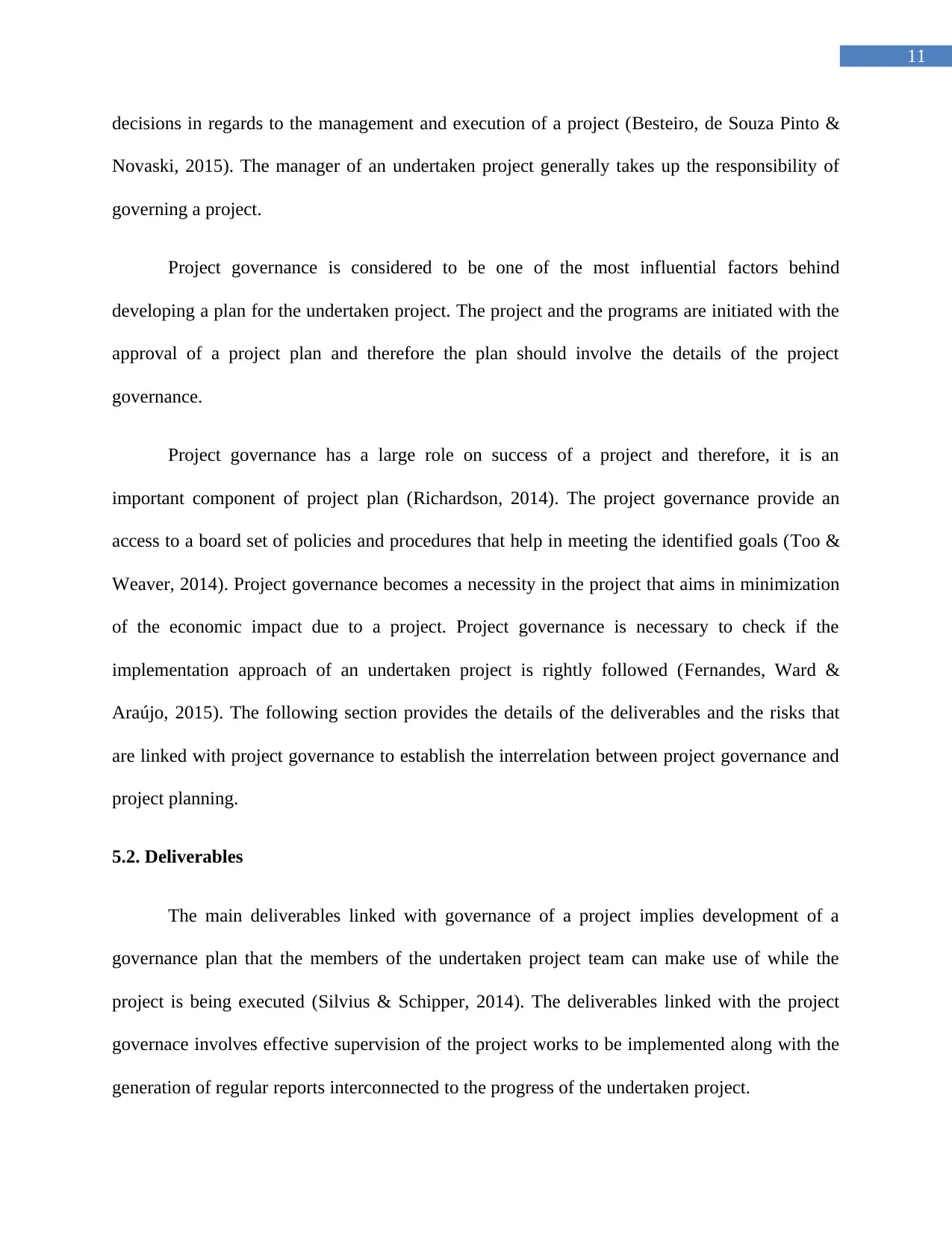
11
decisions in regards to the management and execution of a project (Besteiro, de Souza Pinto &
Novaski, 2015). The manager of an undertaken project generally takes up the responsibility of
governing a project.
Project governance is considered to be one of the most influential factors behind
developing a plan for the undertaken project. The project and the programs are initiated with the
approval of a project plan and therefore the plan should involve the details of the project
governance.
Project governance has a large role on success of a project and therefore, it is an
important component of project plan (Richardson, 2014). The project governance provide an
access to a board set of policies and procedures that help in meeting the identified goals (Too &
Weaver, 2014). Project governance becomes a necessity in the project that aims in minimization
of the economic impact due to a project. Project governance is necessary to check if the
implementation approach of an undertaken project is rightly followed (Fernandes, Ward &
Araújo, 2015). The following section provides the details of the deliverables and the risks that
are linked with project governance to establish the interrelation between project governance and
project planning.
5.2. Deliverables
The main deliverables linked with governance of a project implies development of a
governance plan that the members of the undertaken project team can make use of while the
project is being executed (Silvius & Schipper, 2014). The deliverables linked with the project
governace involves effective supervision of the project works to be implemented along with the
generation of regular reports interconnected to the progress of the undertaken project.
decisions in regards to the management and execution of a project (Besteiro, de Souza Pinto &
Novaski, 2015). The manager of an undertaken project generally takes up the responsibility of
governing a project.
Project governance is considered to be one of the most influential factors behind
developing a plan for the undertaken project. The project and the programs are initiated with the
approval of a project plan and therefore the plan should involve the details of the project
governance.
Project governance has a large role on success of a project and therefore, it is an
important component of project plan (Richardson, 2014). The project governance provide an
access to a board set of policies and procedures that help in meeting the identified goals (Too &
Weaver, 2014). Project governance becomes a necessity in the project that aims in minimization
of the economic impact due to a project. Project governance is necessary to check if the
implementation approach of an undertaken project is rightly followed (Fernandes, Ward &
Araújo, 2015). The following section provides the details of the deliverables and the risks that
are linked with project governance to establish the interrelation between project governance and
project planning.
5.2. Deliverables
The main deliverables linked with governance of a project implies development of a
governance plan that the members of the undertaken project team can make use of while the
project is being executed (Silvius & Schipper, 2014). The deliverables linked with the project
governace involves effective supervision of the project works to be implemented along with the
generation of regular reports interconnected to the progress of the undertaken project.
⊘ This is a preview!⊘
Do you want full access?
Subscribe today to unlock all pages.

Trusted by 1+ million students worldwide
1 out of 22
Related Documents
Your All-in-One AI-Powered Toolkit for Academic Success.
+13062052269
info@desklib.com
Available 24*7 on WhatsApp / Email
![[object Object]](/_next/static/media/star-bottom.7253800d.svg)
Unlock your academic potential
Copyright © 2020–2026 A2Z Services. All Rights Reserved. Developed and managed by ZUCOL.





